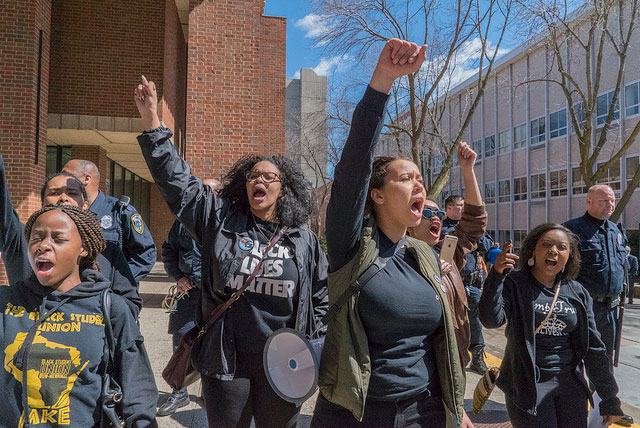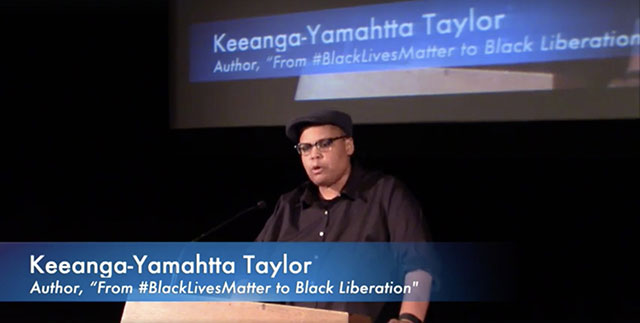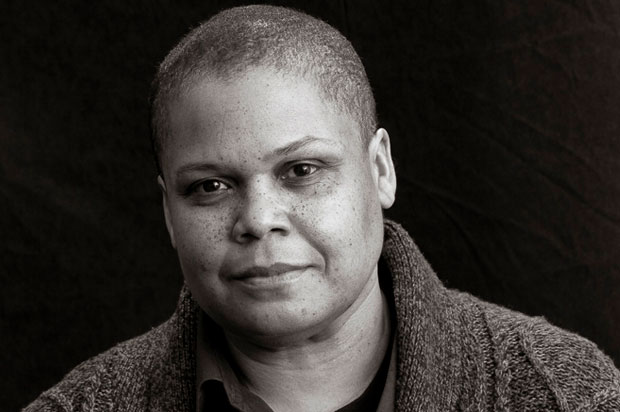
Did you know that Truthout is a nonprofit and independently funded by readers like you? If you value what we do, please support our work with a donation.
Since election night 2016, the streets of the US have rung with resistance. People all over the country have woken up with the conviction that they must do something to fight inequality in all its forms. But many are wondering what it is they can do. In this ongoing “Interviews for Resistance” series, experienced organizers, troublemakers and thinkers share their insights on what works, what doesn’t, what has changed and what is still the same. Today’s interview is the sixteenth in the series. Click here for the most recent interview before this one.
Today we bring you a conversation about the upcoming women’s strike with Keeanga-Yamahtta Taylor, the author of From #BlackLivesMatter to Black Liberation and an assistant professor of African American Studies at Princeton University.
Sarah Jaffe: You were one of the original people who called for a women’s strike on March 8. Can you tell us a little bit about that?
Keeanga-Yamahtta Taylor: The idea for the women’s strike actually didn’t originate in the United States, but it is a call in solidarity with women’s organizations from 30 different countries who put out a call for a strike on International Women’s Day, March 8. This is our effort at trying to explain why it was important that American feminists sign onto this call … in this country, part of our intention is to bring politics back to International Women’s Day by turning it into a political event, by highlighting the ways that women continue to suffer from misogyny and sexism in the United States and to give concrete descriptions of that.
But also, the strike is about highlighting the ways that “women’s work” or “women’s labor” is at times unseen. It can be undervalued, underpaid. The strike is about drawing attention to that by, in effect, extracting those many different manifestations of women’s labor on March 8 to highlight the extent to which women’s labor continues to play a central role in the political and, I would say, social economy of the United States.
 Keeanga-Yamahtta Taylor speaks at the anti-inauguration event in Washington, DC. (Credit: Courtesy of Sarah Jaffe)
Keeanga-Yamahtta Taylor speaks at the anti-inauguration event in Washington, DC. (Credit: Courtesy of Sarah Jaffe)
The call to strike that you coauthored talks about building a feminism for the 99 percent. Can you talk a little bit about what that means?
I think part of what we were reacting to — there are a couple of things. Part of the reaction is against the prevailing notion of “lean-in feminism,” which has been a popular idea, most notably in support of Hillary Clinton’s campaign for president: the idea that the last frontier for women to challenge are these glass ceilings that block the ascension of women in electoral politics or in corporate America. I think for us, that actually is not the last frontier for ordinary and working class women. The traditional shackles on poor and working-class women are still in effect and actually have to be responded to and attended to. The feminism for the 99 percent is about rejecting that idea that women are only or primarily concerned with their role in the elite male world, but that there are still very basic issues such as access to reproductive health care, access to abortion, wage differentials. Black women make $0.63 for each dollar that white men make, for example. Which, of course, is lower than the usual barometer that people use, the $0.78 to the dollar that white women make. Black women make substantially less than that.
There is still the issue of child care. There is no access to public or state funded childcare. The attacks on public education. The attacks on the public infrastructure. All of these have disproportionate impact on the lives of women. On a very basic level, we need a feminist politics that responds to these issues as the most urgent. I think we saw that the outpouring around the January 21 protest showed that there is actually quite vast support for a resurgent feminist movement. Part of our objective is to argue for a certain kind of radical politics within that and not for a political agenda that is quite limited and has these kind of narrow goals about the social mobility of women within corporate America as a sole objective.
Some of the women’s strikes that we have seen just in the past year have come around explicit attacks in different countries. Can you talk a little bit more about the connection with these other international women’s movements and the connection back to the history of International Women’s Day?
I think probably the most well known example involves the women’s strike in Poland in response to the attempt of the state there to impose a ban on abortion. I think that it shows the power of political protest, political demonstration, as opposed to the usual default of embroiling oneself in the formal political process. That was a powerful example. I think the women’s mobilizations, women-led mobilizations for abortion rights in Ireland have helped to create the conditions where there is an actual struggle for not just abortion rights but access to birth control. There are other examples of organizing in Argentina and South Korea and Italy where it is really about women trying to harness their social power outside of the electoral realm, through street demonstrations and organizing to fight for what I would consider to be basic rights.
It does really harken back to the origins of International Women’s Day, which, of course, have become lost over time. It has become this odd Hallmark holiday that has no connection to its radical roots. International Women’s Day came out of a demonstration of working class and poor women in Petrograd in Russia in 1917 in opposition to the First World War, to end the First World War and to fight for the redirection of resources out of war back into the lives of regular people. The slogan was, “Demonstration for Peace and Bread.”
 Keeanga-Yamahtta Taylor. (Credit: Don Usner)
Keeanga-Yamahtta Taylor. (Credit: Don Usner)
Talk about the organizing that is going on to make the strike happen and the connection with the Women’s March organizers.
The organizing has been fast and furious because we have a limited amount of time before March 8. There is some local organizing happening. I know there have been on-the-ground meetings in Philly and New York and Chicago and Berkeley and Pittsburgh, and other places that have called organizing meetings, but on a national level I think it was an important development that … there is one person who was part of [the January 21 Women’s March] organizing team who has been an active participant in the Women’s Strike organizing. There was an agreement that we would work together.
The Women’s Strike National Coordinating Committee has been working with the Women’s March, the January 21 organizers, in terms of trying to put out some joint statements in trying to bring attention to the Women’s Strike, but also, they are planning what they refer to as “A Day Without a Woman” also for March 8, which has a different set of politics and a different platform than the Women’s Strike, but there is a sense that it is better to work together and try to combine our forces than to call a bunch of separate days of action. That is how we have proceeded.
Many of the people, including yourself, who are involved with the call for a women’s strike are socialists. Can you talk about the role of socialism and socialist feminism in this country after the 2016 elections?
At a very basic level, there is an understanding that the problems experienced by women in our societies today are rooted in an economic system that privileges the 1 percent over the 99 percent and that sometimes we think of women’s issues unto themselves, but really these are issues that arise out of an inherently unequal economic arrangement in this country. The fact that women make less, that women don’t have access to child care provisions, that women don’t have access to reproductive health care — they are not just economic questions, but they are related to an economic arrangement that relies on the free labor of women to, in fact, reproduce itself as a political system….
People have really been talking about [this economic inequality] with greater specificity and focus since the eruption of the Occupy movement in 2011, that within that context, those unequal economic relationships have disproportionate effect in the lives of women. I think that in this past election where you literally have a billionaire who has made his money through exploiting loopholes in the system and who has sort of ascended to the political top through his abusing women and his visceral sexism and hatred of women — it is not surprising given the centrality of sexism in Donald Trump’s campaign that the very first protests have been organized by women, mostly attended by women, that have become a focal point of the resistance movement.
You wrote a wonderful book about the Black Lives Matter movement, putting that in historical context. I wonder what your thoughts are in how that movement is changing and shifting under Trump.
I think that Trump put Black Lives Matter as a movement and the activist organizations affiliated with it in the crosshairs early on. I think his entire posture around law and order was created in opposition to Black Lives Matter and what he called a climate that was “anti-police.” That has had a particular impact; for the president of the United States and his supporters to refer to political activists and the political movement as terrorists, which they have done around Black Lives Matter, means a particular thing in the security state atmosphere of the United States.
I think it has put activists on the defensive and in some ways has created a situation where people have almost become internalized, meaning that they are looking inside of their organizations to figure out how to, perhaps, tighten things up and how to politically respond to Trump. It is understandable, but I think we are at a moment where now is the time to look outward and connect with other groups of people who are experiencing some of the same attacks.
There has been a lot of discussion about solidarity and what that looks like. In this climate, it has to look like the collaboration and coordination between groups of people who have all of the interest in the world in working together. So, police abuse and violence is not just an issue affecting African American communities, but we have seen very early on that Trump is trying to expand the powers of the police, expand the responsibilities of the police, and in doing so, putting other groups of people in the crosshairs.
Obviously, the attacks on the undocumented and the attempts of the Trump administration to deputize police officers in the efforts to round up undocumented immigrants, the attacks on Muslims and Arabs, also call on greater powers of the state and its armed agents to do that. These create an almost natural alliance of people to stand up against policing and police abuse.
I think what all of this means is that we need a much bigger movement to confront the police. We need a movement that tries to connect the issues and, by doing so, is actually connecting activists and putting people together to build the largest possible resistance. That also has to be connected to the other attacks that are coming from the Trump administration. [Trump’s attack is] not just about policing, but it is also about how this lays the foundation for an attack on organizing, resistance organizing, opposition organizing, in the first place, by empowering the police to be able to have expansive and intrusive powers. It creates a problem for all of us.
I think there has to be a great effort among folks from Black Lives Matter and other organizations that have been at the center of fighting these things to make these connections with other groups for the sake of expanding the movement — while also preserving the space and understanding that these polices continue to have a disproportionate impact in Black communities — but understanding that we need a much bigger movement to win.
Interviews for Resistance is a project of Sarah Jaffe, with assistance from Laura Feuillebois and support from the Nation Institute. It is also available as a podcast. Not to be reprinted without permission.
A terrifying moment. We appeal for your support.
In the last weeks, we have witnessed an authoritarian assault on communities in Minnesota and across the nation.
The need for truthful, grassroots reporting is urgent at this cataclysmic historical moment. Yet, Trump-aligned billionaires and other allies have taken over many legacy media outlets — the culmination of a decades-long campaign to place control of the narrative into the hands of the political right.
We refuse to let Trump’s blatant propaganda machine go unchecked. Untethered to corporate ownership or advertisers, Truthout remains fearless in our reporting and our determination to use journalism as a tool for justice.
But we need your help just to fund our basic expenses. Over 80 percent of Truthout’s funding comes from small individual donations from our community of readers, and over a third of our total budget is supported by recurring monthly donors.
Truthout has launched a fundraiser to add 432 new monthly donors in the next 7 days. Whether you can make a small monthly donation or a larger one-time gift, Truthout only works with your support.